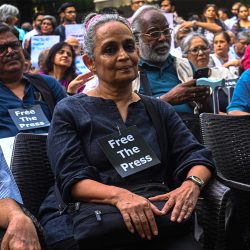The Systematic Silencing of Gaza
Steve Witkoff, the United States Special Envoy to the Middle East, has said that the White House is putting together a “very comprehensive plan” to end the war in Gaza. Donald Trump agreed, claiming that “within the next two to three weeks” there would be a “pretty good, conclusive ending.” In the meantime, though, Israel has expanded its all-out assault on Gaza City, suspending aid operations even as the United Nations declares Gaza to be officially in the grip of a man-made famine. An Israeli spokesman said in Arabic that the evacuation of Gaza City was “inevitable”. The prospect of a ceasefire seems remote, though Qatari mediators have said Hamas has signed up to a ceasefire on terms nearly identical to those proposed by the U.S. and agreed to by Israel. But, as Trump has posted on Truth Social, Israel and the U.S. now believe that only by destroying Hamas and taking over Gaza, can the release of hostages be secured.
It doesn’t appear to matter how many more civilians die in the meantime. “Israel values the work of journalists, medical staff, and all civilians,” Benjamin Netanyahu posted on social media on August 25 responding to global condemnation following the deaths of five journalists in an attack on Nasser Hospital in Khan Yunis, in the southern Gaza Strip. Since the war in Gaza began in October, 2023, at least 197 journalists have been killed according to the Committee to Protect Journalists which has described Israel’s actions as “the deadliest and most deliberate effort to kill and silence journalists that CPJ has ever documented.” Al Jazeera, the Qatari-based news network, puts the number at over 270.
Italian prime minister Giorgia Meloni, speaking at a Catholic festival in Rimini, said the killings were “an unacceptable attack on press freedom and on all those who risk their lives to report the tragedy of war.” British prime minister Keir Starmer called the bombing in Khan Yunis “completely indefensible.” On X, the German foreign ministry said it had “repeatedly called on the Israeli government to allow immediate independent foreign media access and afford protection for journalists operating in Gaza.” Spain described it as “a flagrant and unacceptable violation of international humanitarian law.”
Given the near universal condemnation, will anything be done to hold Israel to account? “More governments are showing a willingness in recent months to call out Israel for its failure to protect journalists and to call for transparent investigations into their killings,” said Jodie Ginsberg, the chief executive of the Committee to Protect Journalists. “But,” she told Coda, “they still stop short on taking any concrete measures - such as sanctions, or conditions on trade agreements or weapons sales - that could force Israel to uphold its obligations under international law.”
Earlier this month, on August 10, Al Jazeera journalist Anas al-Sharif, was killed in Gaza City alongside several of his colleagues. Israel admitted to targeting al-Sharif, describing him as “masquerading” as a journalist. “A terrorist is a terrorist,” Israeli diplomats said, “even if Al Jazeera gave him a press badge.”
According to intelligence sources who spoke to Israeli publication +972 Magazine, the IDF established a special “Legitimization Cell” after October 7, tasked not with security operations but with gathering intelligence to bolster Israel's media image. The unit specifically sought to identify Gaza-based journalists it could portray as Hamas operatives, driven by anger that Palestinian reporters were “smearing Israel's name in front of the world.” Whenever global criticism intensified over the killing of journalists, the cell was instructed to find intelligence that could publicly counter the narrative. "If the global media is talking about Israel killing innocent journalists, then immediately there's a push to find one journalist who might not be so innocent—as if that somehow makes killing the other 20 acceptable," one intelligence source told +972 Magazine. Intelligence gathered was passed directly to American officials through special channels, with officers told that their work was vital to allowing Israel to continue the war without international pressure.
In its initial inquiry into Monday’s bombing of Nasser Hospital in Khan Yunis, Israel claimed a camera at the hospital was “being used to observe the activity of IDF troops, in order to direct terrorist activities against them.” International journalists have no independent access to Gaza. It would be, Ginsberg said, “one way to help force a change in the narrative being pushed by Israel that all Gazan journalists are terrorist operatives and therefore none can be trusted.” Ginsberg told Coda that of the cases of journalists and media workers killed by Israel, CPJ has so far “deemed 26 to be deliberate targeting… these are the cases where we are clear that Israel would have known the individuals killed were journalists and nevertheless targeted them.”
Journalists, as civilians, are protected under international law. Targeting them is a war crime. Yet, Ginsberg notes, since “international journalists and human rights investigators do not have access to Gaza,” it has “hampered documentation.” And “more disturbingly,” she added, “the dehumanization of Gazan journalists and Gazans more generally means there has not been the collective outrage that should accompany any killing let alone killings of this magnitude.”
Israel has already said that the deaths of journalists in the attack on Nasser Hospital were a "tragic mishap" that resulted from legitimate security operations. The recent UN Security Council vote on an immediate ceasefire (14 out of 15 members supporting, only the U.S. withholding) signals Israel’s growing isolation. But American support is all Israel needs to continue its war. As the killings of journalists continue to be explained away, without evidence, as the killing of terrorists, the window for independent reporting in Gaza has likely closed. The systematic targeting of Gazan journalists isn't collateral damage, it's strategic silencing ahead of what may be the war's final phase.
A version of this story was published in our Coda Currents newsletter. Sign up here.
Related Articles
China’s crackdown on Uyghurs reaches the Arctic
The post The Systematic Silencing of Gaza appeared first on Coda Story.









